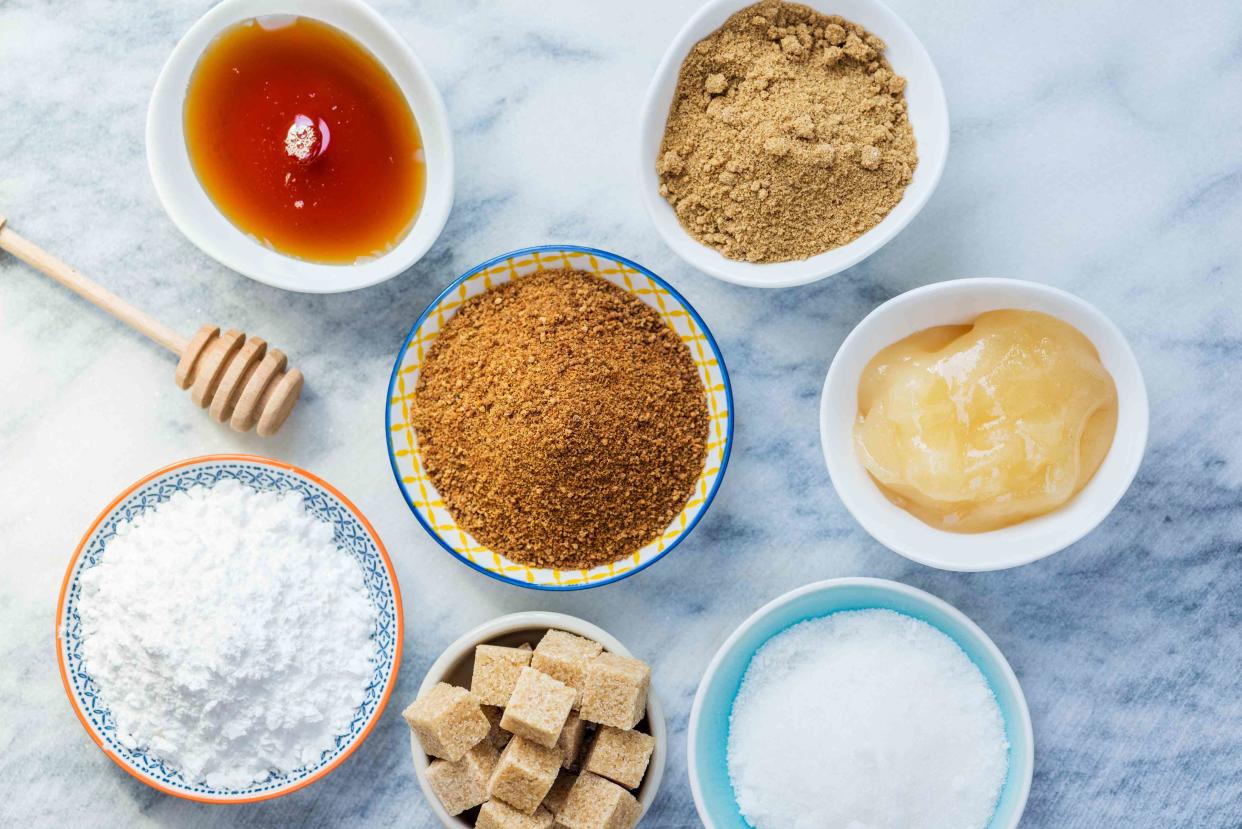Is There Such a Thing as Healthy Sugar?

Manuta / Getty Images
- Oops!Something went wrong.Please try again later.
Fact checked by Nick Blackmer
Key Takeaways
Americans eat about 17 teaspoons of added sugars daily, more than double the recommended amount for women and nearly double for men.
Swapping table sugar for honey or agave nectar doesn’t make added sugar healthier, experts say.
You can consider natural sources of sugar, such as whole fruits, which also provide fiber, minerals, and vitamins.
Replacing table sugar with natural sweeteners like honey or maple syrup sounds like a healthier way to satisfy your sweet tooth, but does this swap make a difference?
Americans consume more than 17 teaspoons of added sugar each day, far exceeding the recommendation of limiting sugar intake to nine teaspoons per day for men and six teaspoons for women.
Naturally occurring sugars are found in whole fruit and milk, while added sugars are put into foods during processing or preparation, such as high fructose corn syrup and table sugar. Although sweeteners like honey, agave nectar, and maple syrup might be labeled as "natural," they still count as added sugars.
“Compared to added sugars, honey, maple syrup, and agave nectar are only slightly better as they have a lower glycemic index and contain some vitamins and minerals," Frank Hu, PhD, MD, a professor of nutrition and epidemiology at the Harvard T.H. Chan School of Public Health, told Verywell in an email.
Overconsumption of any added sugar can still cause the same health problems, Hu added.
Related: Why Do I Crave Sugar?
Natural Sweeteners Are Still Added Sugars
Natural sweeteners sometimes receive a “health halo,” while table sugar is demonized. Agave nectar is one sweetener that is often touted as a “healthier” option because it is 1.5 times sweeter than table sugar and you don’t need to use as much of it.
Honey could help with food allergies and molasses contains iron, but the health benefits of natural sweeteners are all relative, according to Christopher Gardner, PhD, a nutrition scientist and professor of medicine at Stanford University.
“I could say they’re better [than table sugar],” Gardner said. “But better in the scope of what? Should you have had broccoli and cauliflower, or should you have poured honey over your baked ham instead of table sugar?”
Honey is a natural liquid sweetener that is considered healthy because of its antioxidant and anti-inflammatory properties. However, research in 2015 shows that honey, white cane sugar, and high fructose corn syrup have a similar effect on blood sugar and inflammation.
Related: 6 Ways To Cut Back on Your Added Sugar Intake
Opt for More Naturally-occurring Sugars
Although nutrition guidelines recommend limiting added sugars, it doesn’t mean you need to cut all sugar from your diet.
“All sugars are not created equal. For a healthier diet, it’s important to minimize the intake of added sugars commonly found in processed foods,” Hu said.
Instead of following a no-sugar diet, focus on enjoying healthier sources of sugars, like fruits, which also provide fiber, vitamins, and minerals.
“Liquid sugars like soda are absorbed and metabolized rapidly, causing large spikes in blood sugar. On the other hand, sugars in whole fruits like an apple are digested and absorbed more slowly, resulting in a gentler rise in blood sugar,” Hu said.
Eliminating all sugars would also mean cutting out healthy carbohydrates that your body uses for energy.
“We could not live a healthy life or a long life without any carbohydrates,” said Sandra J. Arévalo, MPH, RDN, director of community health and wellness at Montefiore Nyack Hospital.
Whole grains, fruit, and vegetables are all healthy sources of carbohydrates, which the body breaks down into glucose for energy. Arévalo said if your body doesn’t have access to carbohydrates, it will use fat and protein instead, which could be harmful in the long run. Low-carb diets are lower in essential nutrients like fiber and may be linked to heart disease or cancer.
“What we think is the healthiest is something that is obviously more natural. However, that doesn’t mean that everything is bad. We don’t need to blame sugars and say they are all bad. It also depends on the amount of sugar that you’re using,” she said.
Read Next: Does Sugar Consumption Cause Headaches?
What This Means For You
Added sugars, including honey and maple syrup, should be limited in your diet. However, experts recommend getting your sugar intake from naturally-occurring sugars found in whole fruit and milk.
Read the original article on Verywell Health.

